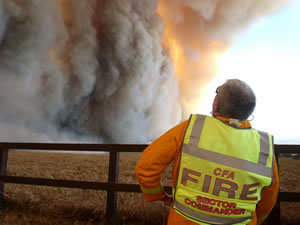
Disaster terminology affects tourism
Wed 24 Feb
Disaster terminology affects tourism

By Roy Weavers
It appears that disaster terminology affects tourism...You think ! Apparently the head of the Country Fire Authority (CFA) has conceded that code red catastrophic fire danger ratings are affecting tourism.
The ratings were introduced this year after the Black Saturday fires in Victoria and range from low to code red. Mick Bourke, CFA CEO says he has spoken to tourism representatives about the effect 'code red ratings' have on visitation.
It appears that the tourism bodies have made it quite clear that more definition is required to explain to the potential visitors what a code red situation is, how many times it might occur and what procedures are in place for dealing with them.
Mr Bourke said, "Some of the talks were about language, I discussed with the representatives words like catastrophic and how it could be misconstrued as just too strong a word."
"We're happy to keep working with them to see, as a review goes on later in the season, whether some of those things should be taken into account." he said.
Editors Comments: I've made my thoughts on this subject very clear over the recent cyclone season. I'm not sure it's the emergency services who have to curb their terminology when dealing with possible natural disasters. I think it's the media who interpret that terminology and turn it into a more sensational situation than is necessary.
This in turn sends a shock wave of panic through our tourists and more importantly our potential tourists. Whatever the emergency services want to call the various cautionary stages of an emergency probably does have to be handled with a little sensitivity but let's not forget an emergency is an emergency. And that message also needs to be broadcast clearly and concisely to ensure both residents and tourists respond in the safest and most appropriate manner.
Maybe the relevant Councils need to help the resorts, hotels and accommodation houses to have more helpful explanatory literature available on what to do in the unlikely event of them being caught up in any of the various natural hazards.
I'm sure if visitors knew that there are procedures in place to handle each possible danger then they would feel more relaxed about the overall picture. Anecdotal evidence in Port Douglas would suggest that our tourists felt quite secure during the two cylcone warnings that we recently went through and actually admired how seriously the community took each warning, even though we all felt there was nothing likely to happen.
Disaster warnings whatever you call them, don't have to end in tragedy. Follow the tried and trusted instructions for a safe and secure outcome and don't believe everything you read the papers !